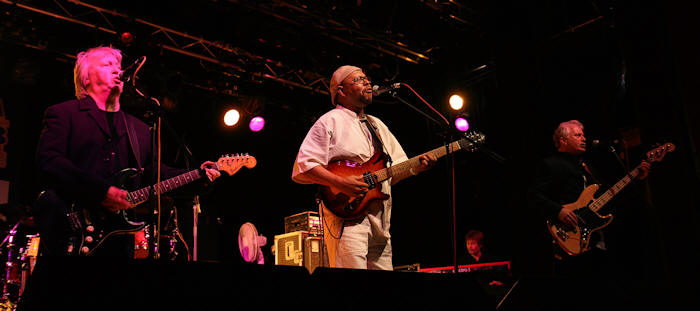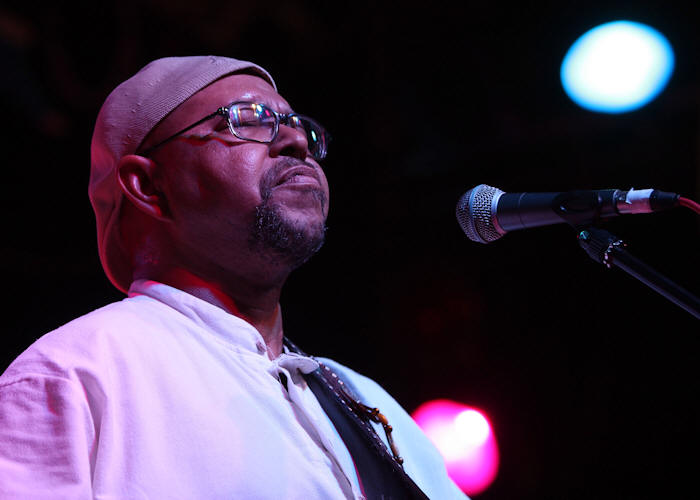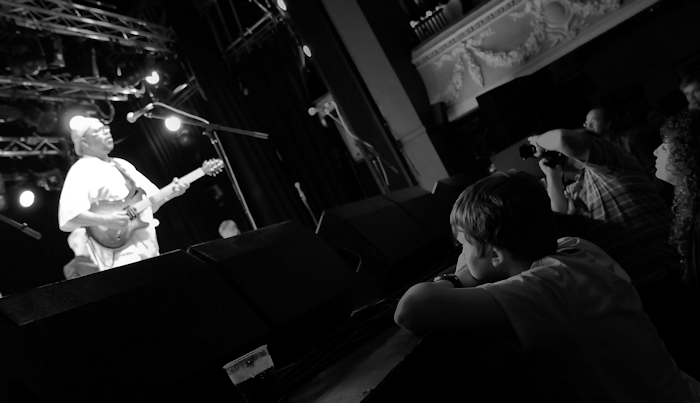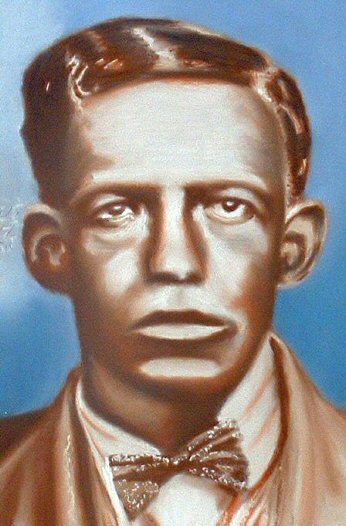
Painting © 2004 Loz
Arkle
Website
© Copyright 2000-2011 Alan White - All
Rights Reserved
Site optimised for Microsoft Internet Explorer
Early Blues Interview
|
|
Alan: What were your first musical memories growing up in Baton Rouge?
Alan: Did you come from a musical family? Larry: No, not in my immediate family, but on the fringes. I had cousins and an uncle who played soul stuff and then I had some other cousins who had an R&B band at that time called The Twisters. Alan: What style of music were you playing in the early days? Larry: You think my mama would let me play blues?? To get my guitar I had to beg my Mama to get me a guitar. My Dad said, ďWell, if you convince your Mama, I ainít the one.Ē They ordered me a guitar from a catalogue . The first lick that I learned was a blues lick, a Jimmy Reid because thatís who my uncle liked. But my Mama told me that the only way I was gonna get me a guitar was if I played it in church. So my first lick in church was a Jimmy Reid! Alan: What first attracted you to the blues? Larry: I lived in a little shotgun house as a kid, and maybe a quarter of a mile down the road they had a juke joint. It was a store during the week and on Fridays and Saturdays it was a juke joint. I remember the Budweiser and Jax beer trucks passing by. As a kid, lying in my bed, Friday and Saturday night, opening the front porch window and through the screens for the mosquitoes youíd hear Silas Hogan and all of them playing. And my cousins went there and theyíd be playing. Itíd be loud then all into the wee hours of the morning and youíd lay there with the window open, listening. Itís been in me one way or the other.
Larry: I went full time in 1994 but I played in bands and when I went in the military in Korea I played in bands. One of my cousins got killed and I then started playing bass in the Twisters when I was 16. Thatís what I like about the old days, you could be 15 or 16 years old and youíd go in clubs and play and nobody give you no grief. They wouldnít serve you no beer but you could come in and listen and play the music Ė and then somebody would buy you a beer. Nowadays everything is so sterilised, itís pitiful. Alan: I believe your big break came in 1992 when you played Burnley Blues Festival. Larry: What happened was Jon Steadman [JSP Records] liked my demo tape (back in the old days when they had cassettes!!), and he put out a couple of CDs on me, Double Dues and Two Blues and he organised all that stuff and got me showcased in England. And Burnley, they liked me and I liked it, I had a wonderful time. Alan: Iíve got a quote from Chris Powers who said ďYou went down a stormĒ! Larry: It was a lot of fun. Alan: Whoís influenced you the most in your song writing? Larry: I like Curtis Mayfield, Boy Dylan and John Hiatt now. It was more from a literary standpoint of storytelling and weíd study the iambic pentameter in literature class and the dadadada dadadada rhythm meant it all came together. And I loved stories. As a kid the old people would tell these stories, some of them scared you to death, but youíd sit down and listen, and thatís really been my goal to captivate an audience with the truth of my stories, just like when I used to sit there. Itís therapy for me, just like it was therapy for those old people, I love it when the audience sits patiently waiting and listening. Alan: Are there any particular songs that you play that have special meaning to you? Larry: All of them do really. When I wrote Juke Joint Woman I was coming from work and I stopped at Tabbyís Blues Box [Heritage Hall nightclub, Baton Rouge] like I always did on a Wednesday, Thursday and Friday and these ladies who worked for the state stopped in. These girls were dressed real nice and they wouldnít normally come to a blues club but theyíd head about Tabby's and they were really carrying on. I said to them, ďYou might all work for the state and think you are all up and that, but you are all juke joint womenĒ. So, yes, every song that I write has some connection with something that happened to me. Alan: How would you describe the Blues? Larry: Life. Simple as that. Alan: Thereís a quote that Iíve heard many times, ďBlues and gospel are often said to be either side of the same coin.Ē Would you agree? Larry: They are the same licks. Believe it or not, somewhere in the bible when I was reading it (Iíve read it through twice from front to back, once in Sunday School, but I didnít really grasp it then so I did it again when I got older) and it says that whatever you do for the world then you try to give it to me. People say, ďIím gonna stop playing for the devil. Iím gonna start playin for the LordĒ and when you take whatever you was doing for the secular world and give it to the God itís an abomination to him, but more and more people are rapping for Jesus but the more they try to do it the more abomination it is. People donít even realise that. So what I do is look at it for what it is. Itís music and I ainít playin it for nobody. Iím doing it to get it off a me. People say, ďAre you playin for the devil?Ē. I ainít playin for the devil but if the devil is at the gig then Iíll be playing his cover. People say, ďAre you playin for the Lord?Ē and I say, ďNo, Iím not playing for the Lord Iím playin for me but if the Lord happen to like it, bravo.Ē So I ainít playin for nobody but the audience and me. Does that make sense?
Larry: In the States itís getting less and less from a blues standpoint and thereís more of a rock-blues standpoint. Itís bad but itís from a money standpoint. You go to a blues festival in the States and they might not have a real blues man in the whole day. A lot of the more entitled kids are calling them bluesmen now Ė come on man! But in Britain and Europe itís always been a better appreciation for the art and creativity. It alwats has been, Itís still good here, but not as colourful as it was, but itís still great. The ones who appreciate it still drive miles and miles. Alan: Are you now living back in Baton Rouge instead of Europe? Larry: I lived over here for 13 months. When I come for these long tours with Alan Robinson I would stay in Lancaster Gate, and I come to find Jimi Hendrix lived in Lancaster Gate and I used to get the tube and go down to Marble Arch, Piccadilly Circus, Oxford Street. I never lived over here for long periods of time but Iíve been over here so many times. Nobody can come up and talk shit to me about England or Germany because Iíve been all over and lived with families and talked to people. The one thing I can say that the world don't know man is that British cheese is the bomb! Itís some good shit. Alan: Lancashire Crumbly is the best. Larry: Hey man, I love it! You can get that at Tesco!
Alan: Youíve been touring with the Norman Beaker band. Where did you first meet Norman? Larry: I met Norman in Burnley, a long time ago. The first time I met him I invited him up on stage to play with me, then Jon Steadman had put out a CD of Norman, the first white band heíd put a CD out on and he told me that these guys really do have an idea what itís about. He put a tour together and when I came over I toured with them a couple of times. He went his way and I went mine; he had a little kid and he was a single parent so he had to work in close areas, but Alex is 29 years old now. Then we met again on Facebook, he wanted to be my friend, and we hooked up again and here we are, itís just as good as ever. Alan: Some music styles can be fads but the blues is always with us. Why do you think this is? Larry: The blues is gonna be. I just look at it a little bit different. I donít look at the blues as music, I look at the blues as life, as a situation that you live, and if you just lucky enough to play an instrument to blend with your situation then you got a good situation. Can you imagine who got the blues all the time and canít play no music to go along with it? Thatís a pitiful nightmare. Iíve heard people say, ďI donít like musicĒ, but how is that possible? Youíve got to listen to music. I feel really bad for a person who donít appreciate art, music or any of those things that massage your mind. Alan: What are your plans now? Larry: Iím going to go down and see if they got some hot food right now. Iím also going to work on another CD and keep working with Norman as much as they will have me over here. Alan: Larry, thank you very much indeed. _________________________________________________________________________
http://www.myspace.com/larrygarnerblues Larry Garner at The Colne R&B Festival 2010
Return to
Blues Interviews List |








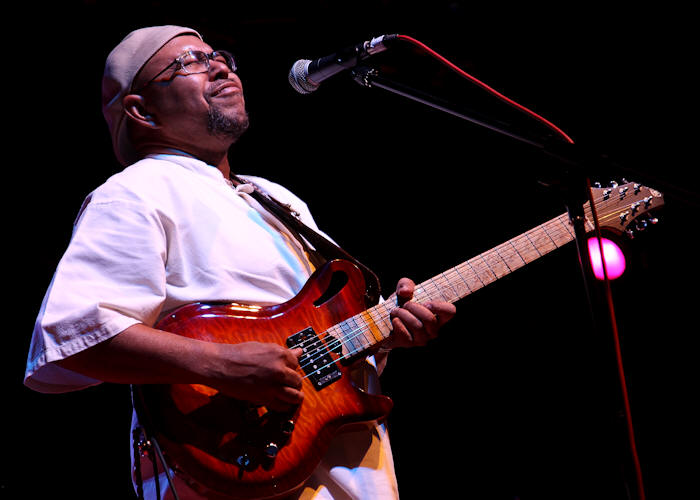
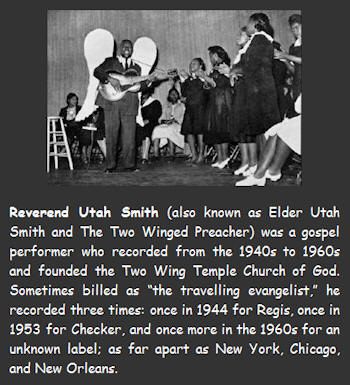 Larry: Well actually, I didnít grew up in Baton Rouge
as a youngster but I started off in a little town called Indianola,
Louisiana. My first musical memories were at Pentecostal church with
preacher Reverend Utah Smith and Reverend Charlie Jackson and I remember
these gospel groups coming around and playing. I was just a little kid
and I fell in love with the guitars. We used to go to my uncle Georgeís
house, he was a paraplegic and he played sitting in his wheelchair And
there was another guy who used to come around, and theyíd sit on the
porch the two of them, and weíd go around after church on Sundays and
whilst everybody was outside, Mama would go inside because she didnít
like that music.
Larry: Well actually, I didnít grew up in Baton Rouge
as a youngster but I started off in a little town called Indianola,
Louisiana. My first musical memories were at Pentecostal church with
preacher Reverend Utah Smith and Reverend Charlie Jackson and I remember
these gospel groups coming around and playing. I was just a little kid
and I fell in love with the guitars. We used to go to my uncle Georgeís
house, he was a paraplegic and he played sitting in his wheelchair And
there was another guy who used to come around, and theyíd sit on the
porch the two of them, and weíd go around after church on Sundays and
whilst everybody was outside, Mama would go inside because she didnít
like that music.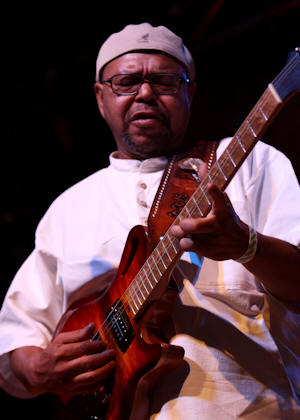 Alan: Youíve been writing poems and stories for many years and
playing the blues part-time. You went full time relatively recently?
Alan: Youíve been writing poems and stories for many years and
playing the blues part-time. You went full time relatively recently?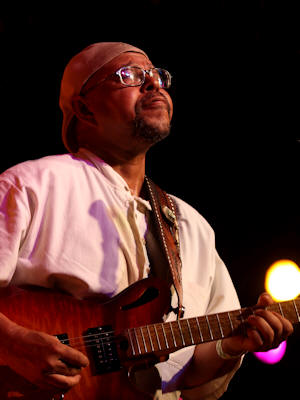 Alan: It does indeed! I believe all your albums have been released
by labels in the UK and Europe. How healthy do you think the blues
scene is in the UK and Europe compared to the States?
Alan: It does indeed! I believe all your albums have been released
by labels in the UK and Europe. How healthy do you think the blues
scene is in the UK and Europe compared to the States?